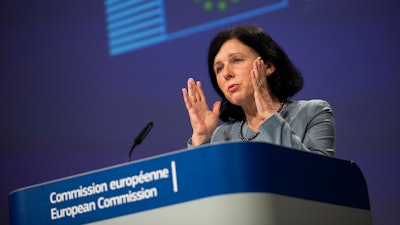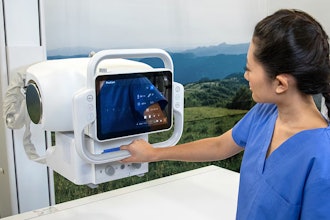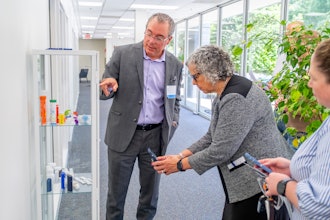
BRUSSELS (AP) — A senior European Union official warned online platforms like Google and Facebook on Wednesday to step up the fight against fake news, coming notably from countries like China and Russia, but she praised the approach of Twitter for fact-checking a tweet by U.S. President Donald Trump.
Unveiling a plan to fight disinformation linked to the coronavirus, European Commission Vice President Vera Jourova said that she wants online tech companies to provide detailed reports each month on the action they are taking to prevent a fake news “infodemic.”
The commission insists that “foreign actors and certain third countries, in particular Russia and China, have engaged in targeted influence operations and disinformation campaigns in the EU, its neighborhood, and globally.” No details were provided.
Jourova praised those U.S. digital giants that agreed to extra scrutiny under a voluntary code of practice aimed at halting the spread of disinformation linked to the virus, but she told reporters that this is just a first step and that “there is room for improvement.”
“They have to open up and offer more evidence that the measures they have taken are working well. They also have to enable the public to identify new threats independently. We invite them now to provide monthly reports with more granular information than ever before,” she said.
She noted that short-video app TikTok would soon sign up to the disinformation code of practice, launched in 2018.
Jourova played down concerns that the EU commission, which proposes laws in the 27-nation bloc and ensures that they are enforced, plans to regulate disinformation itself, saying: “I don’t want to create a ministry of truth.”
But she praised the approach of Twitter last month, when it placed fact-check warnings on two tweets from Trump’s own account that called mail-in election ballots “fraudulent” and predicted problems with the November U.S. elections.
Under the tweets, there is now a link reading “Get the facts about mail-in ballots” that guides users to a Twitter “moments” page with fact checks and news stories about Trump’s unsubstantiated claims.
“I support the Twitter reaction to tweets of President Trump,” Jourova told reporters. “They did not delete it. We all can see it. They provided fact checked information and promoted facts.”
The big U.S. tech companies, which have been filing monthly reports since February 2019 on progress eradicating fake news in general from their platforms, said they supported the EU’s new request for more detailed data on their work to limit virus-related disinformation and advertising.
“We share the European Commission’s goal of reducing misinformation about COVID-19,” Facebook said in a statement. The company noted its efforts on fact-checking, labelling content and “removing hundreds of thousands of pieces of misinformation about the virus that could lead to imminent physical harm.”
Twitter has been “engaging with the European Commission, as well as industry partners, civil society and the research community, since February specifically on COVID-19,” said Sinead McSweeney, its vice president of public policy. The social media company said it was strengthening how it tackles misinformation, including promoting better media literacy across the EU.
Google said it’s cooperating with Jourova and national authorities and is committed to finding “new and creative ways to continue the fight against disinformation.”






















